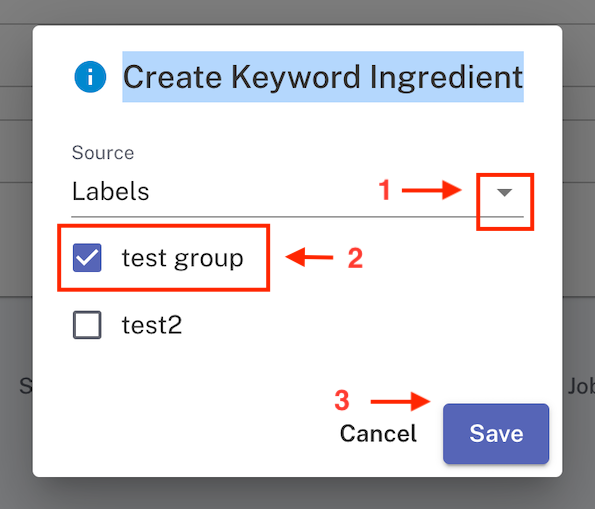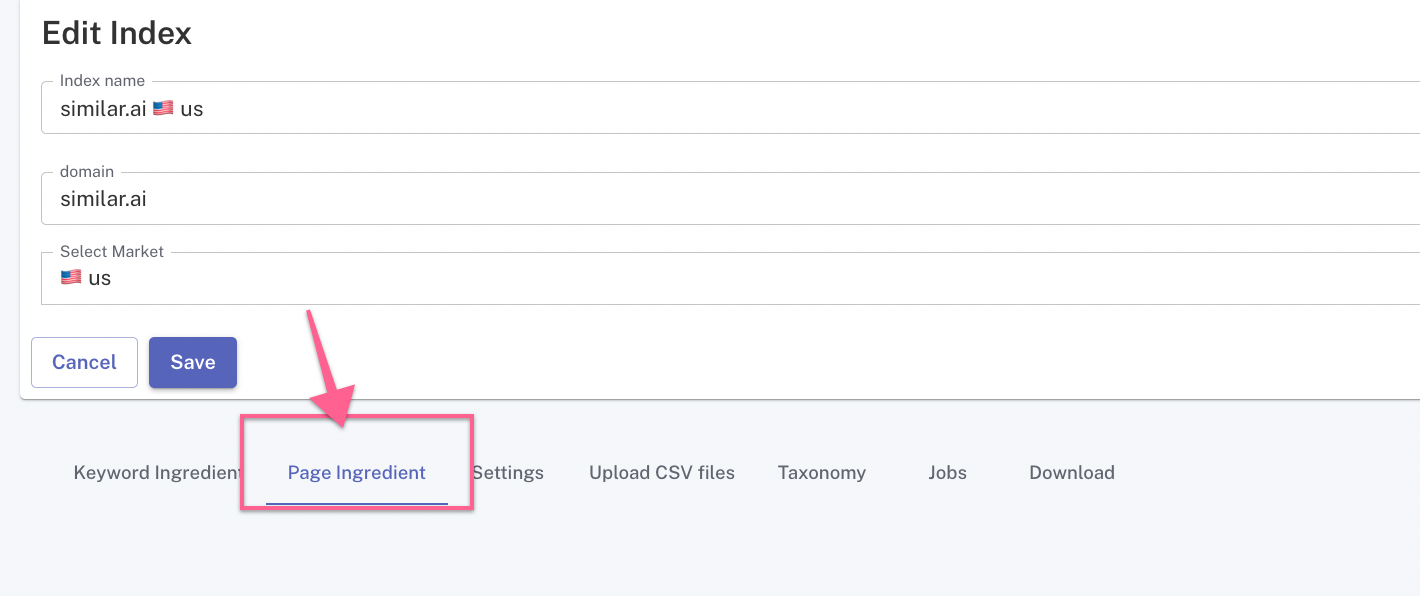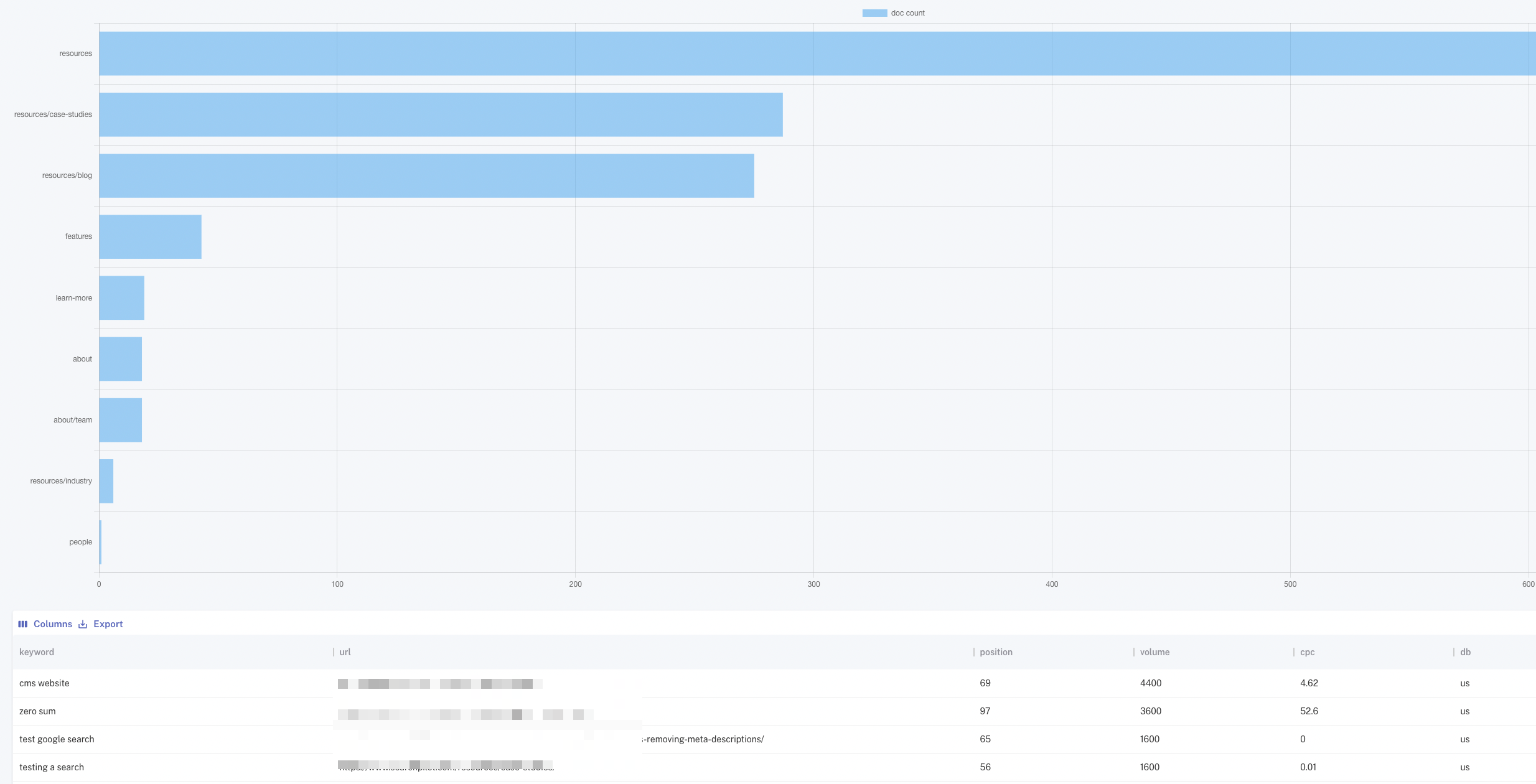
March 31, 2023
What are label keyword ingredients and how to use them
Table of Contents
- What are label groups?
- What are label keywords?
- How to upload a spreadsheet
- How to create label groups
- How to add label keyword ingredients
- How to use label keywords
- Example use cases
In this post we explain how to use label keywords in the Similar AI toolbox. This is a powerful way to model a site’s taxonomy, both hierarchical and flat structures; that can then be used to help inform your SEO strategy. It is also a way to model the taxonomy of a site while using the same vocabulary the business uses to describe what they do.
What are label groups?
Label groups are a way to describe any set of categories or facets that are used to navigate on a website. Labels groups can be applied to flat or hierarchical categories, facets or any other set of vocabulary that is used on a website.
For instance, a fashion site might have categories like clothing, jeans and jumpers and facets like cotton or blue. These are all labels. The hierarchical category structure is a hierarchical label groups. Material and colour are other label groups. Different types of site structure which you can model with label groups include:
- the category structure
- the browse structure
- the taxonomy
- the category hierarchy
- attribute groups
- and facets
What are label keyword ingredients?
Label keyword ingredients let you add keywords from the local market to your index based on all the possible permutations of a site’s label groups. Typically you create label keyword ingredients by first uploading a spreadsheet or CSV file, adding those as label groups then adding the label keyword ingredients. From here, you can turn these into topics and match them to pages.
How to upload a spreadsheet, Google Sheet or CSV file to add label groups
Step 1: First save the data you want to upload as a CSV (comma separated value), normally on your local hard drive or desktop.
Step 2:
- To upload login into your Index and navigate to Setup
- Select Upload CSV files
Step 3:
- Select taxonomy in the drop down as the document type
- Click upload → then Select the CSV file you want to upload into the Similar.ai toolbox
How to create label groups
Step 1:
- Navigate to Taxonomy
- Click Add Label
Step 2:
- In the Popup window name your label group and select the file and columns you want to include, if there are multiple columns.
- Click save.
Once you choose one of the available files, you can choose which columns to use as the label group.
How to add label keyword ingredients
Step 1. In Setup
- Navigate to Keyword Ingredients
- Click Add New
Step 2. In the Create Keyword Ingredient popup window
- Select Source = Labels
- Check the label groups you require. Typically, you’ll choose different label groups e.g. brand and category, so that you can find the keywords that mention a combination of them.
- Click Save
Step 3. Your label keyword ingredient will now appear in the keyword ingredient table below
- Go to the wishbone icon on the right side, click and select Fetch
- You can now view the results by selecting Result
Note: depending on the size of the label group it may take time for all the results to be ready. Label keyword ingredients are slower to run than competitive keyword ingredients.
How to use label keyword ingredients
The Similar AI toolbox will take your keyword combinations and then fetch the actual search volumes for those keywords. It will only bring back keyword combinations that have actual user queries. This can be useful for research on where to focus your SEO efforts. Grouping the label keywords into topics, which are groups of keywords where Google and other search engines show similar results is a powerful way to use label keyword ingredients. When you do this, the Similar AI toolbox will show you which topics match to which labels.
There are many ways to use label keywords ingredients for SEO research and practical SEO strategies. Here are a couple of examples of how to use label keywords
Many fashion sites are based on the combination of brands, such as Gucci or Tiger of Sweden, and categories, such as loafers or jumpers. You can use label keyword ingredients to find all the permutations of these with search volume.
Many local service sites are formed from a combination of a service category such as home solar energy, wooden fence installation or bathroom remodeling, and a location such as Brooklyn, Eugene or Ohio. Forming a lot of pages with duplicated content – aka doorway pages – is terrible for search engine users. They are terrible because few of these pages have original content and few of them are sought-after, the two dimensions which search engines try to maximize. Label keyword ingredients can be used to find the topics with demand that solve a real need.



